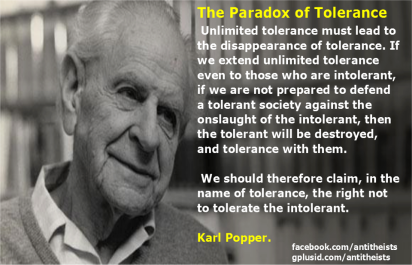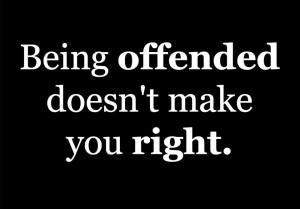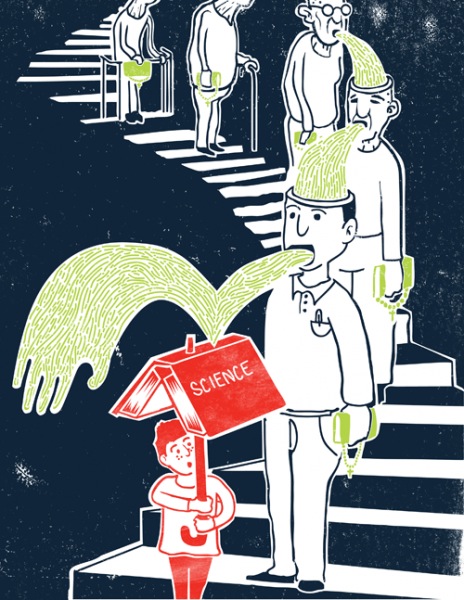“I will cast terror into the hearts of those who disbelieve. Therefore strike off their heads and strike off every fingertip of them”
– Qur’an (8:12)
There is a currently fashionable assertion that any view is automatically as worthy of respect as any equal and opposite view. That we should not only tolerate religious belief and practices, but we should work to accommodate and ingratiate such practices in society wherever possible. So charmed is the status of faith in society, that any critical discussion causes offence, and should be avoided.
Any outspoken critic of religion will recognise, the fiercest defenders of faith are often those without religion themselves, and will know how uncomfortable it is to trespass this taboo, even within a close circle of family and friends. In all corners of society, it seems we have bought into the idea that faith (belief in the absence of reason) is a good thing. Surrendering reason, probably the only faculty that differentiates us from higher primates, probably isn’t a good thing, ever, but I’m not going to use this post to argue that point. In this post, I just ask that you consider the following question: In a society that preaches faith as a virtue, how can we possibly criticise the actions of religious people behaving as instructed by their holy book?
For the gunmen who launched their murderous attack on the Charlie Hebdo office, it was the satirical critique of their faith, that they know should exist beyond a hint of criticism, that motivated their barbarism. They know this because they literally believe what is written in the Koran. In a society that encourages faith, should we really be surprised when a small percentage of religious people take their holy book seriously?
To allow one faith, is to allow them all. Not to do so is intellectually dishonest. If faith is belief in the absence of reason, what reason could possibly be used to distinguish one faith from another? Either we demand intellectual rigour from our beliefs, or we don’t. This begs the question, how should we differentiate between the fundamental, radicalised Muslim who takes the Koran literally (it is God’s word, after all) and the moderate, peaceful Muslim who simply ignores the Koran’s calls to violence. If faith is a virtue, how can we prohibit the first and permit the second?
We can’t, but more importantly, we shouldn’t. In the aftermath of the Charlie Hebdo massacre, much of the mainstream media, in particular the BBC, has gone to great lengths to point out the actions of these murderers do not represent ‘real’ Islam, as if there was an obvious distinction. In matters of faith, by definition, there can be no distinction.
I do not want to upset people needlessly, but in the case of religion, the need to openly criticise and discuss these ridiculous ideas is significantly more important than the potential hurt feelings of the faithful. Religious ideas should be no more immune to criticism than political ideas, artistic ideas, or scientific ideas, and in the case of the latter, we have seen what can be achieved through a systematic approach of criticising ideas. In science, we are encouraged to ask the question “what if I’m/you’re wrong?” – the kind of question people only ask when genuinely interested in truth.
Of the world’s 1.2 billion Muslims, it is estimated that between 15–25% are radicalised. That’s 180 Million-300 million people (the entire population of the USA), utterly content with ideas of jihad, martyrdom, and blasphemy, demanding nothing less than the death penalty for apostates, and the brutal suppression of women. These ideas are amongst the most disgusting, hateful, fascist ideas possible, and yet, out of ‘respect’ for those of faith, and fear of being considered islamophobic, we remain disturbingly silent.
There are of course many millions of peaceful, loving, compassionate moderates, but when defending the rights of these moderates, we should consider the following. In 1939, most Germans were moderate, peaceful people, but it was the radicals that drove a Nazi agenda, leading to World War 2 and the death of 60 million people. The behaviour of the moderates was insignificant.
World War 3 will be a war of ideas, and in many ways is already under way. Superstition, fear and dogma will increasingly give way to science and humanism, and like a cornered animal will get increasingly more violent as the end approaches. I ask the morally courageous amongst you to never accept faith as a virtue, to treat faith as you would any discourse that claims to know more than it possibly can. The future of our species depends on the ability of the next generation to make good decisions. The future of our species depends on our ability to criticise bad ideas. #JeSuisCharlie.



